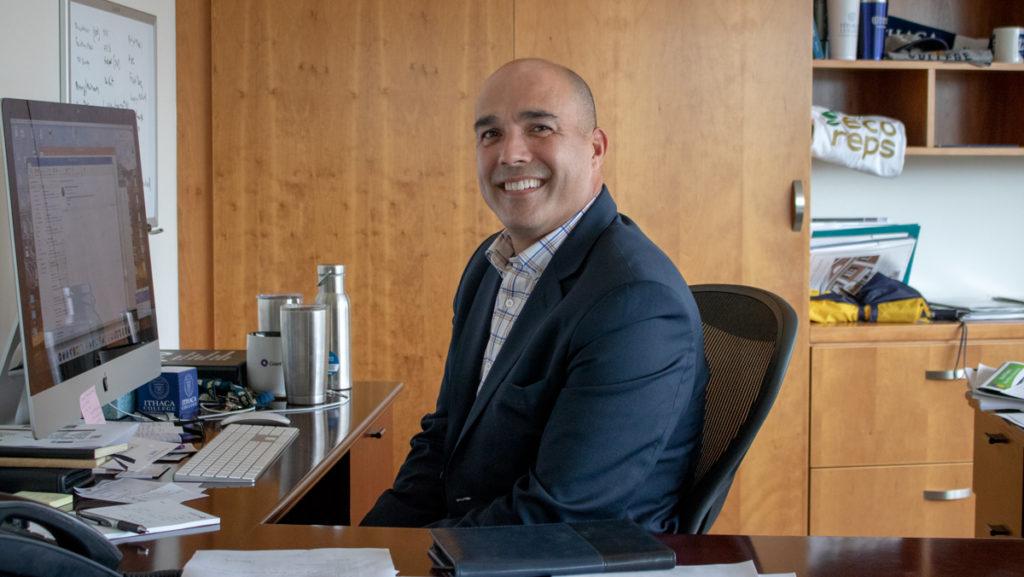One of the newest additions to Ithaca College President Shirley M. Collado’s senior leadership team is William Guerrero, who was announced as the college’s new vice president for finance and administration May 10 and started his tenure July 16. Previously, beginning in August 2016, Janet Williams served as interim vice president.
Staff writer Sam Haut spoke with Guerrero about his new position and what he hopes to discover and improve while working at the college.
This interview has been edited for length and clarity.
Sam Haut: What kind of challenges do you think you will face at the college as vice president of finance and administration?
William Guerrero: I would say certainly, my number one goal is to get to know the community, get to know the students and faculty and staff. It will be a lot of time, [which] probably will be a part of that challenge, to make sure I’m out there in the community listening to students and the faculty and the staff so I can really understand the great opportunities that are here and any challenges I can help them with.
SH: What do you know about the college’s current financial situation?
WG: I can tell you the school is certainly positioned to afford some great opportunities for the future. My predecessors, the three previous chief financial officers, did a really good job in getting IC in this position. But the landscape has definitely changed, and IC is much better positioned than other schools within higher education.
SH: How so?
WG: We still have an operating positive margin, so we’re still operating very efficiently, but certainly the trends of just trying to create affordability at the school is affecting all schools around the entire country. And so you see that with a growing need, for sure, regarding financial aid and supporting students.
SH: Do you hope to be able to do something about that?
WG: Oh absolutely, certainly, it’s a concern for everybody to improve and increase access and inclusion and social equity and social justice here for all students. So you certainly want to make a great institution like IC … affordable for as many as possible.
SH: Do you know what kind of steps you’d like to take to make it more affordable?
WG: I don’t yet. I’ve been here for five weeks, but I would say there is plenty of opportunity here. There is some amazing, amazing faculty, staff and students here that are brilliant, that have a tremendous amount of ideas out here, and we have great leadership. I think with President Collado, we have great leadership to look at all these potential opportunities that exist here.
SH: What kinds of issues would you like to address at the college?
WG: I want to be able to look at our financial operations so we can become more efficient and therefore, be able to offer more. So, it’s not that I manage financial aid and can dictate it, but if you run the operations more efficiently, you can be able to provide more. But besides financial aid, I would say as I continue to meet more students, faculty and staff … other conversations will come up. At this point in time, it’s certainly at the very new stage of learning the community and the culture to be able to pinpoint anything.
SH: You mention a lot of amazing opportunities exist at the college. What exactly do you mean by that?
WG: Number one, you look at this beautiful campus. The summer months can be tremendous opportunities to leverage the beautiful assets that we have, let alone the beautiful weather. So, there can be multiple opportunities that could exist here. As in one example, you can have many different types of academic, athletic, community partnership–type of camps here. That’s an opportunity looking at the physical assets and the timing of it. But Ithaca, in it of itself and the town surrounding it, is absolutely gorgeous, so who wouldn’t want to be here? There are some amazing ideas that will certainly surface as the community gets to know me more and gets comfortable with me.
SH: Do you think you’d want to integrate ideas from students as well?
WG: Absolutely. I would tell you that’s where a lot of the ideas come through. Just for an example, in my short period of time — I was just so ecstatic when it came across my desk, I was like absolutely, that’s something we definitely can do — is that Unagh Frank idea to swipe out hunger. That’s a tremendous idea that helps a community. It’s a national issue, but that’s just one example. Students have so many tremendous ideas.








